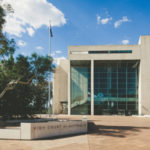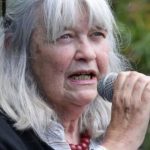Public Service Employee Told to Shut Up or Ship Out

Hands up if over the past several months you wished you’d had the foresight to buy shares in Zoom, or Microsoft? Or Telstra? Or in fact, any of the big tech companies?
Because aside from the manufacturers of hand sanitiser, tissue and toilet paper, while the rest of the world has been facing an impending pandemic-related economic meltdown, the tech companies are doing rather nicely, taking advantage of the fact that at the height of Covid-19 we all became reliant on technology like never before, and to a significant degree, remain so.
And it didn’t take a genius to figure that out.
Recently, a federal government employee wrote a post for a fledgling blog called the Oxford Political Review about exactly this topic – how the big tech companies are benefiting from Covid-19, because as populations around the globe were forced into isolation, we all became, by default, increasingly dependent on online platforms to school our children, to work, to shop, and the socialise.
Unlike mine, the post by Josh Krook did not mention any big tech companies by name. His discussion was general in nature – an observation and a discussion.
That sounds ok, doesn’t it? Well, according to his employer at the time, The Australian Federal Government, it wasn’t ok at all.
And, despite the fact that Josh Krook did not write about Australian government policy nor did he mention that he was, at the time, working in the industry department, on tech policy, he still found himself face to face with a superior some weeks later, and given two choices: remove the post, or face termination.
The problem, said his superior, was that in talking about the big tech companies, there was a risk of damaging the relationship between them and the government, and that if at any time his name was Googled and associated with authorship of the post, then tech companies could potentially refuse to work for the government.
Initially, Josh Krook did what he was told to do, but he has since left his job over what he believes is unfair censorship.
The case of Michaela Banerji
His case is not dissimilar to that of Michaela Banerji who lost her unlawful dismissal case against the Federal Government last year. Ms Banerji was fired in 2013 for posting criticisms of the Government’s immigation policies under a pseudonym on Twitter while she was an employee of the Department of Immigration and Border Protection (now known as the Department of Home Affairs).
The High Court made a unanimous decision in the government’s favour because the Australian Public Service (APS) Code of Conduct states that employees must remain apolitical.
APS guidelines include stipulations that “an APS employee must take reasonable steps to avoid any conflict of interest (real or apparent) in connection with the employee’s APS employment” and must “uphold the integrity and good reputation of the employee’s agency and the APS”.
Furthermore, they make it clear that just liking or sharing social media posts could amount to a breach of the rules.
And this creates a very serious consequence because those in the political sphere and working in all echelons of Government are in fact, some of the nation’s most qualified people to comment on politics and policy.
What about freedom of speech?
It’s a common misnomer that we are all guaranteed freedom of speech, despite the fact that Australia is technically a democracy. Freedom of speech is not explicitly protected by the Australian Constitution.
What’s more, slowly over time, several laws have slowly impeded the right of individuals to speak out about the government.
And two groups that have felt the full force of these laws in recent years are former or current government employees and journalists.
Laws with the power to silence
The Border Force Act which came into effect in 2015. These laws enable the Commissioner to tell “entrusted persons” not to report serious misconduct or criminal activity if it affects, or is likely to affect, the operations, responsibilities or reputation of the Department.
And under section 42 of the Act, it is an offence to make a record or disclose protected information. The penalty is imprisonment for two years.
An “entrusted person” means the Secretary, the Australian Border Force Commissioner or an Immigration and Border Protection worker, but the definition can include anybody who carries out work in a detention centre, whether working for the government, an agency, or a contractor hired to perform services. This includes doctors, teachers, or just about anyone who is engaging in paid work of some form.
In 2018, the National Security Legislation Amendment (Espionage and Foreign Interference) Bill was passed, creating a series of laws that penalise Commonwealth officers that leak classified information. These laws also criminalise all the steps that go into reporting such information to the public, and impose serious penalties, in some instances attracting a life sentence.
Whistleblower David McBride, whose case is currently before the courts, has pleaded not guilty to five charges, which consist of one count of the theft of Commonwealth property, three counts of breaching defence legislation and another count of unauthorised disclosure of information.
These charges relate to Mr McBride having handed over a swag of classified military documents to ABC journalists in 2016, which were the basis of the The Afghan Files report, which was the article that led the AFP to raid the Sydney ABC offices in June 2019.
Increasing censorship
Censorship is becoming increasingly prevalent in Australia. When you consider the fact that Josh Krook was reprimanded so sternly over a pretty innocuous blog post, you have to wonder if the government is paranoid… or what it really is trying to hide.
Certainly we are seeing an increasing number of attempts to silence the masses.
One example is the reinvigorated push by Home Affairs Peter Dutton to have mobile phones banned in immigration detention centres. Similar action in 2017 was thwarted by a Federal Court ruling, but Mr Dutton is having another attempt at having the legislation passed.
Many see this as a political maneuver to hide what goes on in these centres as well as isolate detainees from the rest of the world. Essentially this would mean no transparency or accountability for the operation and management of these centres, or for the behaviour of those in positions of authority at these facilities.
As the call for a Bill of Rights – which would protect our basic freedoms, such as freedom of speech – gets louder and more frequent, it seems the Morrison Government’s appetite to introduce it gets weaker. And yet without it, every law that restricts the Australian public’s right to know, or to express themselves, goes against the fundamental principles of democracy.







